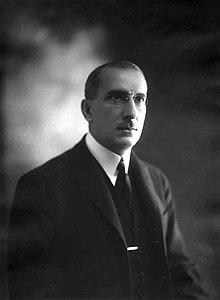 | |
| Presidency of Artur Bernardes 15 November 1922 – 15 November 1926 | |
Vice President | |
|---|---|
| Cabinet | See list |
| Party | PRM |
| Election | 1922 |
| Seat | Catete Palace |
|
| |
Artur Bernardes' tenure as the 12th president of Brazil lasted from 15 November 1922, after he defeated Nilo Peçanha in the 1922 presidential election, until 15 November 1926, when he transferred power to Washington Luís. A representative of the so-called "milk coffee policy" and the last years of the First Brazilian Republic, Bernardes ruled the country almost continuously under a state of emergency, supported by the political class, rural and urban oligarchies, and high-ranking officers of the Armed Forces against a series of tenentist military revolts.
In the urban centers, especially in Rio de Janeiro, the Bernardes administration was unpopular due to the rise of inflation and currency devaluation caused by coffee valorization policies. The administration cut public spending, transformed the Bank of Brazil into an issuing bank and sought a loan from British bankers. Negotiations for the loan were unsuccessful, but many of the recommendations of the British mission of financial experts, led by Edwin Montagu, were followed. At the end of 1924, the government expelled São Paulo politicians from the direction of the country's economy, abandoned federal support for the protection of coffee and began a contractionary and recessive policy, which achieved its goals of containing inflation and exchange rates at the expense of contracting industrial output.
The federal government supported the overthrow of the dominant parties in the states that had supported Nilo Peçanha (federal intervention in Rio de Janeiro and state of emergency in Bahia) and mediated armed conflicts (1923 Revolution in Rio Grande do Sul and expeditions against Horácio de Matos in Bahia). From July 1924 until the end of Bernardes' term, conspirators in lower military ranks tried to overthrow the regime, which they considered corrupt and backward. The longest campaign, the Prestes Column, discredited the government but failed to threaten the federal capital.
Power was maintained with an iron fist: reorganization of the capital's political police (the 4th Auxiliary Police Bureau), the bombing of São Paulo, censorship of the press, closure of unions, mass arrests, torture, and exile to the penal colony of Clevelândia. With a majority in Congress, the government enacted labor laws, introduced income tax, instituted the right of reply in the press and facilitated complaints against journalists for slander and defamation, included moral and civic education in the schools' curricula and revised the 1891 Constitution with a centralizing amendment. In foreign policy, Brazil's maneuvers to obtain a permanent seat on the League of Nations' Deliberative Council culminated in the country's withdrawal from the organization.
